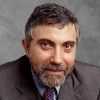 De Nobelprijs voor de Economie gaat dit jaar naar de 55-jarige Amerikaan Paul Krugman, wegens zijn studie waarom sommige landen de internationale handel domineren en hoe de economie leidt tot een wereldwijde verstedelijking.
De Nobelprijs voor de Economie gaat dit jaar naar de 55-jarige Amerikaan Paul Krugman, wegens zijn studie waarom sommige landen de internationale handel domineren en hoe de economie leidt tot een wereldwijde verstedelijking.
By having integrated economies of scale into explicit general equilibrium models, Paul Krugman has deepened our understanding of the determinants of trade and the location of economic activity. (Bron, PDF)
Wie is Paul Krugman?
Sinds 2000 is Paul Krugman hoogleraar economie en internationale betrekkingen aan de Princeton-universiteit. Voordien doceerde hij aan de Yale-universiteit, de Stanford-universiteit en het Massachusetts Institute of Technology. Sinds 2008 is hij ook verbonden aan de London School of Economics.
Tijdens zijn loopbaan schreef Krugman ongeveer tweehonderd wetenschappelijke publicaties en een twintigtal boeken. Daarnaast geniet hij een grote bekendheid dankzij zijn wekelijkse columns voor de The New York Times die sinds 2007 worden aangevuld met een blog.
Aanvaardingstoespraak
Op mijn verjaardag, 8 december, gaf Paul Krugman een toespraak aan de universiteit van Stockholm. In de Aula Magna werd hij geïntroduceerd door professor Bertil Holmlund, voorzitter van het Nobelprijscomité voor de economie.
The Increasing Returns Revolution in Trade and Geography
Thirty years have passed since a small group of theorists began applying concepts and tools from industrial organization to the analysis of international trade. The new models of trade that emerged from that work didn’t supplant traditional trade theory so much as supplement it, creating an integrated view that made sense of aspects of world trade that had previously posed major puzzles. The “new trade theory” – an unfortunate phrase, now quite often referred to as “the old new trade theory” – also helped build a bridge between the analysis of trade between countries and the location of production within countries.
In this paper I will try to retrace the steps and, perhaps even more important, the state of mind that made this intellectual transformation possible. At the end I’ll also ask about the relevance of those once-revolutionary insights in a world economy that, as I’ll explain, is arguably more classical now than it was when the revolution in trade theory began.
